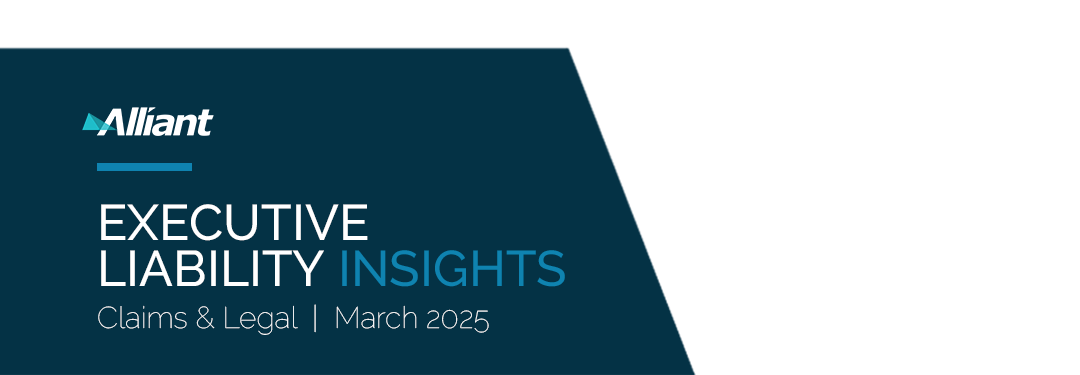
Navigating today’s complex risk environment can be a monumental task. Steve Shappell, Alliant Claims & Legal, spearheads Executive Liability Insights, a monthly review of news, legal developments and information on executive liability, cyber risk, employment practices liability, class action trends and more.


FEATURED ARTICLE
COURT BROADLY APPLIES “MEANINGFUL LINKAGE” STANDARD IN INTERRELATED WRONGFUL ACTS ANALYSIS
A Delaware court held that an SEC investigation and subsequent Securities Class Action were “meaningfully linked,” thus, limiting coverage to a prior policy period. A pharmaceutical company (the “Company”) was insured under two consecutive D&O insurance programs (“Tower 1” and “Tower 2”).
In This Issue:
NINTH CIRCUIT HOLDS THAT SHAREHOLDER CLAIMS MUST BE TRACEABLE UNDER SECTION 11 AND 12(a)(2)
Priani v. Slack Techs., Inc., 20-16419 (9th Cir. Feb. 10, 2025).
On remand from the Supreme Court, the Ninth Circuit held that a shareholder was unable to state a claim under section 11 and section 12(a)(2) of the Securities Act of 1933 because they were unable to trace their share purchases to an allegedly misleading registration statement.
Read More >>
TRUSTEES HAVE NO STANDING TO SUE D&O INSURERS FOR DECLARATORY JUDGMENT
Fluharty v. Phila. Indem. Co. (In re Levine), 2025 U.S. App. LEXIS 4487 (4th Cir. 25 Sep. 2025).
A federal court in West Virginia held that the bankrupt CEO’s trustee (the “CEO’s Trustee”) and the Insured Company’s Bankruptcy Trustee cannot sue the Insurer for a declaration that the Trustees have consent rights under the policy.
Read More >>
COURT REJECTS INSURER’S BROAD APPLICATION OF A BREACH OF CONTRACT EXCLUSION IN QUI TAM ACTION
Pangea Equity Partners LP et al. v. Great American Insurance Group et al., No. N23C-12-060 MAA CCLD (Del. Super. Ct. Mar. 12, 2025).
A Delaware court ruled that a breach of contract exclusion did not preclude coverage for a qui tam action filed against an insured and required the insurers to defend the action. A real estate investment firm (the “Firm”) was sued in a qui tam action under the False Claims Act (“FCA”) for allegedly submitting false certifications regarding the rent comparability for the Section 8 housing program.
Read More >>
DELAWARE’S CONTROVERSIAL AMENDMENTS TO ITS CORPORATE LAW PASSED BY STATE SENATE IN RESPONSE TO CONCERNS OVER “DEXIT”
With some recent high profile developments in Delaware, state legislators have passed statutory amendments (the “amendments”) to Delaware law aimed at addressing the potential wave of companies seeking to reincorporate in other states. These amendments provide safe harbors for conflict transactions, including transactions with controlling stockholders, as well as limitations on stockholder books and records inspections.
Read More >>
INSURERS AVOID COVERAGE BASED ON “CHANGES IN EXPOSURE” PROVISION
PNC Bank NA v. Axis Ins. Co. et al., 2025 U.S. App. LEXIS 6651 (3d Cir. Mar. 21, 2025).
We previously reported on a court’s decision that a policy’s “Changes in Exposure” provision precluded coverage for an acquired bank under the acquirer bank’s insurance policies even though the policies defined “predecessors in business” as insureds. The decision was appealed and affirmed by the Third Circuit.
Read More >>
DELWARE COURT FAVORS BROAD COVERAGE AND HOLDS STOCK PAYMENT CONSTITUTES COVERED LOSS
AMC Ent. Holdings, Inc. v. XL Specialty Ins. Co., 2025 Del. Super. LEXIS 84 (Feb. 28, 2025).
A Delaware court held that a company’s stock payout in connection with a shareholder settlement constituted covered “Loss” as defined by its D&O policies. The decision and proposed settlement arose from a shareholder suit against the company over a proposal to increase the company’s authorized number of common shares.
Read More >>
FCC TO MOVE AWAY FROM SECTION 230 PROTECTION FOR ONLINE PLATFORMS?
Under the Trump administration, there is an effort to remove Section 230 protection for online platforms with the Federal Communications Commission (FCC) appearing poised to revisit how it regulates online platforms in terms of their moderation of content.
Read More >>
EMPLOYEMENT CORNER
Click to read the following cases:
- EEOC TARGETS ELITE LAW FIRMS IN ATTEMPT TO ROOT OUT DEI PRACTICES
Read More >>
SECURITIES CORNER
Click to read the following cases:
- FEBRUARY 2025 NOTEWORTHY ENFORCEMENT ACTIONS FILED
- FEBRUARY 2025 NOTEWORTHY SETTLEMENTS AND JUDGEMENTS
Read More >>
SHAREHOLDER CORNER
Click to read the following cases:
- FEBRUARY 2025 SECURITIES CLASS ACTION FILINGS
Read More >>
COURT BROADLY APPLIES “MEANINGFUL LINKAGE” STANDARD IN INTERRELATED WRONGFUL ACTS ANALYSIS
In re Alexion Pharmaceuticals, Inc., 2025 Del. LEXIS 52 * (Del. Feb. 4, 2025).


A Delaware court held that an SEC investigation and subsequent Securities Class Action were “meaningfully linked,” thus, limiting coverage to a prior policy period.
A pharmaceutical company (the “Company”) was insured under two consecutive D&O insurance programs (“Tower 1” and “Tower 2”). During the Tower 1 policy period, the Company reported an SEC subpoena regarding potential violations of federal securities laws and the Foreign Corrupt Practices Act ("FCPA"). The allegations involved bribes and gifts to foreign officials, related to the Company’s sales practices. The primary insurer accepted the subpoena as a notice of circumstance. Then, during Tower 2’s policy period, shareholders filed a securities class action (the “Class Action”) alleging violation of securities laws, unethical and illegal sales practices, improper data procurement and funding of foreign organizations. The Company sought coverage for the Class Action under Tower 2.
The primary insurer (the same under both policy periods) initially accepted the Class Action under Tower 2; however, later reassigned coverage to Tower 1. In doing so, the insurer argued that the Class Action arose from “the circumstances and anticipated Wrongful Acts” reported in the earlier notice of circumstance. The Company challenged the insurer’s determination and argued that the specific focus of the subpoena differed from the Class Action and that the matters were only “tangentially” linked.
Applying Delaware law, the court found that the Class Action was meaningfully linked to the wrongful acts reported in the notice of circumstance, as the Class Action arose from the same wrongful acts—the Company’s improper sale practices and grantmaking activities worldwide. The court applied a broad interpretation of the “meaningful linkage” standard, emphasizing that the focus should be on the commonality in the underlying wrongful acts alleged, and not the specific nature of the investigations, parties involved, or relief sought. As a result, the Class Action was deemed to have been first made during the Tower 1 policy period.
NINTH CIRCUIT HOLDS THAT SHAREHOLDER CLAIMS MUST BE TRACEABLE UNDER SECTION 11 AND 12(a)(2)
Priani v. Slack Techs., Inc., 20-16419 (9th Cir. Feb. 10, 2025).


On remand from the Supreme Court, the Ninth Circuit held that a shareholder was unable to state a claim under section 11 and section 12(a)(2) of the Securities Act of 1933 because they were unable to trace their share purchases to an allegedly misleading registration statement. In a recent ruling, unrelated to this case, the Supreme Court held that, to prevail on a section 11 claim, a shareholder was required to plead that they purchased securities traceable to the materially misleading registration statement.
In the underlying matter, a technology company (the “Company”) went public through a direct listing where the plaintiff (the “Shareholder”) purchased a large number of shares in the Company. Following the direct listing, the Company reported a decline in its share pricing. As a result, the Shareholder brought this class action asserting claims under sections 11 and 12(a)(2). The Shareholder’s allegations focused on the Company’s registration statement being inaccurate and misleading.
The trial court acknowledged that the Shareholder did not and could not allege that the shares were registered under and traceable to Company’s Registration Statement but concluded that such an allegation was unnecessary. Thus, the trial court held that the Shareholder’s allegations were sufficient because the registration statement was false and because the securities purchased were “of the same nature as those issued pursuant to the registration statement.” The Ninth Circuit affirmed the lower court’s decision, and the matter escalated to the U.S. Supreme Court.
The Supreme Court noted that section 11 “authorized an individual to sue for a material misstatement or omission in a registration statement when he has acquired ‘such security.’” The term “such security” referred to the security offered in the registration statement and “to bring a claim under section 11, the securities held by the plaintiff must be traceable to the particular registration statement alleged to be false or misleading.” Thereafter, the Court remanded the case back to the Ninth Circuit to decide (1) whether the Shareholder’s pleading satisfied section 11 as properly construed and (2) to reconsider the Shareholder’s argument under section 12 due to the recent holding about the meaning of section 11.
While the Supreme Court highlighted that sections 11 and 12(a)(2) “contain distinct language . . .” and do not “necessarily travel together,” the Ninth Circuit concluded that the Shareholder failed to plead standing to pursue a claim under both section 11 and 12(a)(2). The Shareholder argued that Section 12(a)(2) provided that “[a]ny person who . . . offers or sells a security . . . by means of a prospectus or oral communication, which includes an untrue statement of a material fact or omits to state a material fact necessary in order to make the statements . . . not misleading . . . shall be liable . . . to the person purchasing such security.” The Ninth Circuit reasoned that “such security” referred to the “security” that was offered or sold “by means of a prospectus or oral communication.” Because a sale “by means of a prospectus” can only happen in a registered offering, the Ninth Circuit held that Section 12(a)(2) “imposes the same traceability requirement as section 11.” Thus, the Shareholder was unable to state a claim under section 11 or section 12(a)(2).
TRUSTEES HAVE NO STANDING TO SUE D&O INSURERS FOR DECLARATORY JUDGMENT
Fluharty v. Phila. Indem. Co. (In re Levine), 2025 U.S. App. LEXIS 4487 (4th Cir. 25 Sep. 2025).


A federal court in West Virginia held that the bankrupt CEO’s trustee (the “CEO’s Trustee”) and the Insured Company’s Bankruptcy Trustee cannot sue the Insurer for a declaration that the Trustees have consent rights under the policy.
In the underlying matter, the Company filed an action against its former CEO, accusing him of fraud. The CEO sought coverage from the carrier, which provided defense that was eroding the aggregate coverage limit. The CEO then filed a personal bankruptcy proceeding which automatically stayed the Company’s action against the CEO. To continue pursuing the allegations of fraud against the CEO, the Company’s bankruptcy trustee (the “Company’s Trustee”) requested that the court lift the stay. In doing so, the Company’s Trustee admitted that the CEO’s debt was uncollectable because the CEO had no personal interest beyond insurance coverage in the action. While mediating the action against the CEO, the Insurer advised the Company’s Trustee that the CEO’s consent was needed for the settlement. The Company’s Trustee disagreed and argued that the CEO Trustee’s (and not the CEO’s) consent was required. The trustees sought a declaratory judgment that the settlement rights were the assets of the bankruptcy estate.
The court rendered a decision, stating that the trustees in this matter did not have a “case” or “controversy” to sue in the first place. Standing limits a court’s ability to hear cases and safeguards courts from issuing advisory opinions. Having standing means demonstrating an injury that is traceable to the allegations and redressable by the court.
The Company’s Trustee, according to the court, was concerned that payment of defense costs may affect their rights to recover from the D&O policy. However, that fear alone did not manufacture standing to sue. The CEO’s Trustee, according to the court, had no standing because the Company’s Trustee admitted that the CEO had no personal interest in litigation beyond insurance proceeds. Thus, because any debt of the CEO was discharged in bankruptcy, the underlying action posed no threat to the CEO’s personal bankruptcy. Put simply, CEO’s Trustee could not demonstrate a sufficient injury in fact to sue the Insurer because the CEO’s debt to the Insured Company was uncollectable.
COURT REJECTS INSURER’S BROAD APPLICATION OF A BREACH OF CONTRACT EXCLUSION IN QUI TAM ACTION
Pangea Equity Partners LP et al. v. Great American Insurance Group et al., No. N23C-12-060 MAA CCLD (Del. Super. Ct. Mar. 12, 2025).


A Delaware court ruled that a breach of contract exclusion did not preclude coverage for a qui tam action filed against an insured and required the insurers to defend the action.
A real estate investment firm (the “Firm”) was sued in a qui tam action under the False Claims Act (“FCA”) for allegedly submitting false certifications regarding the rent comparability for the Section 8 housing program. The Firm sought coverage from its insurers under its D&O liability policies, which was denied based on a breach of contract exclusion (the “contract exclusion”) in the policy. The contract exclusion stated that the insurers would not be liable to make any payment for loss, “based upon, arising out of, relating to, directly or indirectly resulting from or in consequence of, or in any way involving any actual or alleged breach by [the Firm] of an express or implied contract or agreement.”
The Firm sued the insurers alleging breach of contract and bad faith, arguing that the contract exclusion was inapplicable to the qui tam action because the crux of the complaint was the alleged regulatory violations. Conversely, the insurers invoked a broad interpretation of the contract exclusion, arguing that the qui tam action arose from the Firm breaching its housing assistance payment contracts with the Chicago Housing Authority.
Finding in favor of the Firm, the court applied Delaware law which required insurance policy exclusions to be “construed narrowly in favor of coverage.” The court found that the contract exclusion could not apply broadly as it would render nearly all claims remotely connected to a contract uncovered. In addition, the court expressed that the nature of a qui tam action is one of federal law violations, not breach of contract allegations. Here, the court held that the contract exclusion did not apply to the qui tam action because the underlying complaint did not explicitly allege any breach of contract allegations in addition to the FCA violations. The court held that an insurer’s duty to defend is broad and enforceable where the underlying allegations would trigger coverage. Thus, the insurers were required to defend the Firm in the qui tam action.
DELAWARE’S CONTROVERSIAL AMENDMENTS TO ITS CORPORATE LAW PASSED BY STATE SENATE IN RESPONSE TO CONCERNS OVER “DEXIT”


With some recent high profile developments in Delaware, state legislators have passed statutory amendments (the “amendments”) to Delaware law aimed at addressing the potential wave of companies seeking to reincorporate in other states. These amendments provide safe harbors for conflict transactions, including transactions with controlling stockholders, as well as limitations on stockholder books and records inspections.
The new amendments provide a safe harbor in all conflicted transactions for directors, officers or a controlling shareholder if (i) the material facts as to the person’s interest in and involvement in the transaction, including any such potential conflicts are disclosed; and (ii) the transaction is approved in good faith by an informed majority of disinterested directors or shareholders.
For controlling shareholder going private transactions, both procedural steps – i.e., informed disinterested director and shareholder approval – must be followed to render the transaction protected. A controlling shareholder is defined as an individual or group who (i) owns or controls a majority in voting power of outstanding stock or (ii) has the right to nominate the majority of the board. Additionally, the amendments recognize that such transactions may also not result in breaches of fiduciary duties for controlling shareholders if the transactions were shown to be fair to the corporation. This is an important enhancement as it codifies a presumption of director independence that can be rebutted only with substantial and particularized facts.
Lastly, the Delaware legislature amended the scope of "books and records” requests under Section 220. Despite some changes, Section 220 will maintain its “proper purpose” requirement as a prerequisite for inspection of books and records. The list is narrowly construed to include board of directors and committee meeting minutes, annual financial statements, stockholder agreements, and director and officer independence questionnaires. The amendment further provides that the Court of Chancery may not order the production of any documents other than those enumerated, unless there is an absence of documents, and the stockholders can provide clear and convincing evidence that additional records are necessary and essential to the stockholder's purpose.
INSURERS AVOID COVERAGE BASED ON “CHANGES IN EXPOSURE” PROVISION
PNC Bank NA v. Axis Ins. Co. et al., 2025 U.S. App. LEXIS 6651 (3d Cir. Mar. 21, 2025).


We previously reported on a court’s decision that a policy’s “Changes in Exposure” provision precluded coverage for an acquired bank under the acquirer bank’s insurance policies even though the policies defined “predecessors in business” as insureds. The decision was appealed and affirmed by the Third Circuit.
Following an acquisition of another bank, the acquiring bank was sued for the acquired bank’s mismanagement of trust accounts which occurred years before the purchase transaction. The insured bank sought coverage, arguing that its financial institution professional liability coverage included "predecessors in business" in the definition of Insured. However, the insurers argued that the “Changes in Exposure” provision excluded coverage for wrongful acts committed by the acquired bank prior to the transaction.
The policy’s Changes in Exposure Provision stated:
If, during the Policy Period: (i) an organization or entity becomes a Subsidiary, or (ii) the Company acquires any organization or entity by merger into or consolidation with the Company, then coverage shall apply to such organization or entity and the Insureds of such organization or entity, but only with respect to Wrongful Act(s) committed, attempted, or allegedly committed or attempted, at the time of or after such event, unless the Underwriter agrees, after presentation of all appropriate information, to provide coverage by endorsement for Wrongful Act(s) by such Insureds prior to such event.
The insured argued that the provision did not apply because the bank was a subsidiary of the Parent Company when it made the acquisition, incurred the judgment and defended the lawsuit, and was seeking coverage for itself, not on behalf of the acquired bank. The court dismissed this argument and found that “under the provision, if [the bank] or the Parent Company acquires another company, the Insurers will not cover claims for wrongful acts committed by the acquired company before the acquisition occurred.” Because the underlying lawsuit focused on the acquired bank’s wrongful acts taken before the acquisition, the Changes in Exposure Provision applied. “That [the bank] became the successor in interest to [the acquired bank], defended the lawsuit, and paid the judgment does not negate the provision's application; indeed, it contemplated that sequence of events.”
This case highlights the importance of carefully drafting policy language. If parties choose to forego purchasing runoff coverage in anticipation that the acquirer’s insurers will cover the prior acts of acquired entities, then it must be clearly constructed to avoid these gaps in coverage.
DELWARE COURT FAVORS BROAD COVERAGE AND HOLDS STOCK PAYMENT CONSTITUTES COVERED LOSS
AMC Ent. Holdings, Inc. v. XL Specialty Ins. Co., 2025 Del. Super. LEXIS 84 (Feb. 28, 2025).


A Delaware court held that a company’s stock payout in connection with a shareholder settlement constituted covered “Loss” as defined by its D&O policies. The decision and proposed settlement arose from a shareholder suit against the company over a proposal to increase the company’s authorized number of common shares.
The company tendered the Securities Claim to its D&O tower. The issue presented was whether one of the excess insurers would be responsible to cover its share of the proposed settlement given that such payment would be made in the form of company stock.
The court favored a broad interpretation of the applicable policy language and rejected the excess carrier’s argument that the value of shares of stock were excluded from the definition of Loss as the stock shares are different from payments of monetary amounts. The court held that the policies did not restrict coverage solely to cash payouts or other monetary amounts. Additionally, the court pointed out that the term “pay” as used within the policies’ definition of “Loss” was not a defined term and thus was not properly subjected to a non-existent restrictive interpretation that was not specified in the policy terms and conditions.
Despite not being defined within the policies’ definition of “Loss” the court looked to other provisions in the policy to further support their position. Namely, the court turned to a listed exclusion that defined the term “paid” as applying to stock transfers. While the issue of whether the stock payout constituted a covered “Loss,” the company still faces additional challenges to the settlement and specifically, whether the excess insurer provided consent to the settlement.
FCC TO MOVE AWAY FROM SECTION 230 PROTECTION FOR ONLINE PLATFORMS?


Under the Trump administration, there is an effort to remove Section 230 protection for online platforms with the Federal Communications Commission (FCC) appearing poised to revisit how it regulates online platforms in terms of their moderation of content.
Since the development and rapid growth of the internet, we all have been exposed to the misinformation, disinformation, and outright hate speech on the internet. Since 1996, Section 230 of the Communications Decency Act has been the benchmark for federal regulation of online platforms by providing limited federal immunity to providers and users of interactive computer services, preventing them from being treated as publishers of content created by others and shielding them from liability for content moderation decisions. Simply put, platforms are essentially self-regulating, and they are not responsible for the content that is posted by their users. However, Brendan Carr, the agency chair of the FCC under the Trump administration is looking to revisit that standard.
While the details were not readily available, Republicans used social media to claim that certain platforms have censored or suppressed conservative views online. In order to prevent or combat such censorship, Republicans believe that platforms engaged in politically motivated content moderation should lose their Section 230 protections.
The FCC Commissioner, a democrat, believes that Carr’s interpretation of Section 230 is an attempt to "increase government control of online speech." The Commissioner further notes that this shift "is meant to bully private social media companies to comply with direct demands from the administration." Congress is the only body of government capable of making such a change, but if the United States does move away from the protections afforded to online platforms by Section 230, it would be by allowing the government to come in and attempt to regulate free speech.
Employment Corner
EEOC TARGETS ELITE LAW FIRMS IN ATTEMPT TO ROOT OUT DEI PRACTICES
The new acting chair of the EEOC issued letters to some of the nation’s top law firms demanding information about the firms’ diversity-related employment policies and programs. The letters stem from the Trump administration’s push to eliminate diversity, equity, and inclusion (“DEI”) programs, arguing that such programs constitute illegal job discrimination in violation of Title VII of the Civil Rights Act of 1964.
Securities Corner
|
Director/Officer |
Role |
Company |
|
Harshad Shah & Virendra Parekh |
Founders |
Namah Wealth Creation and Preservation, L.P. |
|
Elchonon Schwartz |
Founder |
Nightingale Properties, LLC |
|
Alan Burak |
Founder |
Never Alone Capital LLC |
|
Justinas Butkus |
Founder |
HMC Trading LLC and HMC Management LLC |
|
Director/Officer |
Role |
Company |
|
Harshad Shah & Virendra Parekh |
Founders |
Namah Wealth Creation and Preservation L.P. |
|
Elchonon Schwartz |
Founder |
Nightingale Properties, LLC |
|
Alan Burak |
Founder |
Never Alone Capital LLC |
|
Justinas Butkus |
Founder |
HMC Trading LLC and HMC Management |
FEBRUARY 2025 NOTEWORTHY SETTLEMENTS AND JUDGMENTS
|
Amount |
Director/Officer |
Role |
Company |
|
$19,773,815.60 |
Thurman P. Bryant, III |
Founder |
Bryant United Capital Funding, Inc. |
|
$78,613,242 |
Kalistratos Kabilafkas |
Officer |
Airborne Welness Network |
|
$1,791,785 |
Christopher Rabalais |
Former Director |
The New Sports Economy Institute |
|
$293,407.41 |
Jonathan Wilcox & Jason Boucher |
Former CFO |
American Renal Associates Holding, Inc. |
|
Amount |
Director/Officer |
Role |
Company |
|
$19,773,815.60 |
Thurman P. Bryant, III |
Founder |
Bryant United Capital Funding, Inc. |
|
$78,613,242 |
Kalistratos Kabilafkas |
Officer |
Airborne Wireless Network |
|
$1,791,785 |
Christopher Rabalais |
Former Director |
The New Sports Economy Institute |
|
$293,407.41 |
Jonathan Wilcox & Jason Boucher |
Former CFO Former Officer |
American Renal Associates Holdings, Inc. |
Source: U.S. Securities and Exchange Commission
https://www.sec.gov/litigation/admin.htm
Source: Stanford Law School Securities Class Action Clearinghouse
ABOUT ALLIANT INSURANCE SERVICES
Alliant Insurance Services is the nation’s leading specialty broker. In the face of increasing complexity, our approach is simple: hire the best people and invest extensively in the industries and clients we serve. We operate through national platforms to all specialties. We draw upon our resources from across the country, regardless of where the resource is located.
Contributors


Abbe Darr, Esq.
Claims Attorney
abbe.darr@alliant.com
Chuck Madden, Esq.
Claims Attorney
chuck.madden@alliant.com
David Finz, Esq.
Claims Attorney
david.finz@alliant.com
Isabel Arustamyan, Esq.
Claims Attorney
isabel.arustamyan@alliant.com
Jacqueline Vinar, Esq.
Claims Attorney
jacqueline.vinar@alliant.com
Jaimi Berliner, Esq.
Claims Attorney
jaimi.berliner@alliant.com
Karina Montoya, J.D.
Claims Advocate
karina.montoya@alliant.com
Malia Shappell, Esq.
Claims Attorney
malia.shappell@alliant.com
Michael Radak, Esq.
Claims Attorney
michael.radak@alliant.com
Naomi Egwakhide Oghuma, J.D.
Claims Advocate
naomi.egwakhideoghuma@alliant.com
Peter Kelly, Esq.
Claims Attorney
peter.kelly@alliant.com
Robert Aratingi
Senior Claims Advocate
robert.aratingi@alliant.com
Steve Levine, Esq.
Claims Attorney
slevine@alliant.com